The "Walking Tour: Civil Rights History – The Church, Children & Community" in Birmingham, Alabama, provides a unique opportunity to explore the influential role of faith and youth in shaping the Civil Rights Movement. Participants visit key sites like the historic 16th Street Baptist Church and Kelly Ingram Park, uncovering stories of bravery and community resilience. With small group sizes, the tour encourages meaningful conversations that connect past struggles to present challenges. As they walk through these hallowed grounds, they’ll find themselves questioning how history continues to influence today’s social landscape.
This experience made our list of the 6 Best Historical Tours In Birmingham.
Good To Know
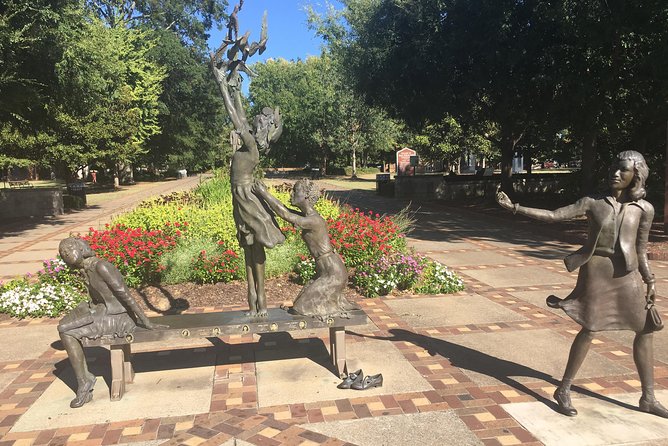
- The tour visits significant sites like the 16th Street Baptist Church, highlighting its role as a gathering space during the Civil Rights Movement.
- Children played a crucial role in activism, symbolizing hope and courage through events like the Children’s Crusade.
- Churches served as safe havens, organizing protests, voter registration drives, and inspiring community leadership during the movement.
- Each landmark offers unique stories that reflect struggles, triumphs, and the ongoing impact of the Civil Rights Movement.
- The intimate group size fosters meaningful discussions, allowing participants to engage deeply with the history of Birmingham’s civil rights efforts.
Overview of the Walking Tour
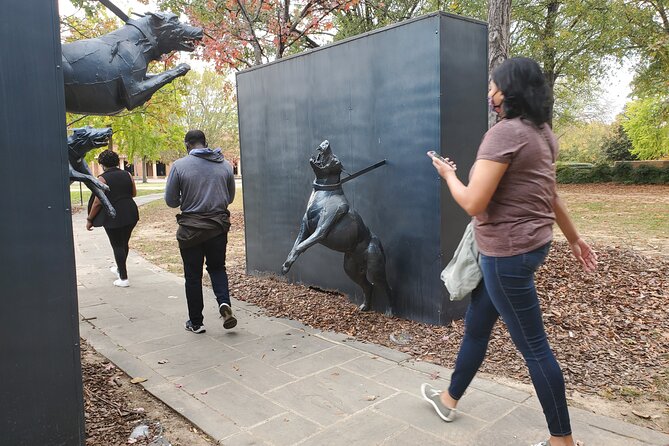
The Civil Rights History Walking Tour in Birmingham, Alabama, offers an engaging and insightful experience for participants eager to learn about the pivotal moments of the Civil Rights Movement.
This tour uniquely combines historical education with personal storytelling, emphasizing the roles of church leaders and children in the fight for equality. Travelers explore the city’s rich heritage, guided by knowledgeable hosts who share their passion for the subject.
With a maximum group size of 12, participants receive personalized attention, fostering deeper discussions about the events that shaped civil rights. The tour meets at 1601 5th Ave N, ensuring a convenient start and return.
For just $65.99, attendees can enjoy Birmingham’s profound history while enjoying a memorable and enlightening journey.
You can also read our reviews of more walking tours in Birmingham
Key Landmarks Visited
Participants on the Civil Rights History Walking Tour will visit several key landmarks that played crucial roles in the Civil Rights Movement.
Each site offers a unique glimpse into the past, showcasing the struggles and triumphs of those who fought for equality.
-
16th Street Baptist Church: A pivotal site where activists gathered and a tragic bombing took place in 1963.
-
Kelly Ingram Park: Known for its powerful protests and demonstrations, this park served as a rallying point for civil rights activists.
-
Birmingham Civil Rights Institute: An educational facility that highlights the history and ongoing impact of the Civil Rights Movement.
These landmarks not only tell a story but also inspire participants to reflect on the ongoing journey toward justice and equality.
The Role of the Church
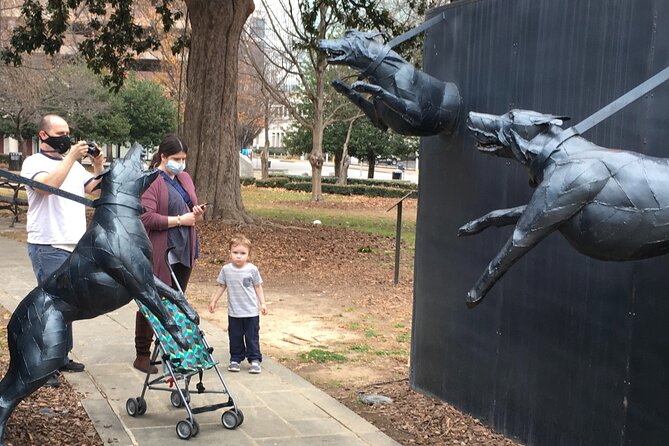
Churches played a vital role in the Civil Rights Movement, serving as both safe havens and rallying points for activists. They provided a space where community members could gather, strategize, and find solace amid turmoil.
Leaders like Dr. Martin Luther King Jr. often delivered powerful sermons from church pulpits, inspiring hope and unity. Plus, churches organized protests, voter registration drives, and community outreach programs, becoming essential hubs for mobilizing efforts toward equality.
The 16th Street Baptist Church, in particular, became a symbol of resilience after the tragic bombing in 1963. Through faith and activism, these religious institutions not only nurtured community spirit but also ignited a movement that sought justice and change in the face of systemic oppression.
Involvement of Children
Children played a pivotal role in the Civil Rights Movement, often becoming symbols of innocence and hope amidst the struggle for equality. Their involvement not only brought attention to the cause but also showcased their courage and determination.
Young activists participated in protests, marches, and sit-ins, challenging segregation and injustice.
- They faced violence yet stood firm, inspiring adults.
- Events like the Children’s Crusade in Birmingham highlighted their bravery.
- Their voices emphasized the urgent need for change, making them integral to the movement.
Personalized Tour Experience
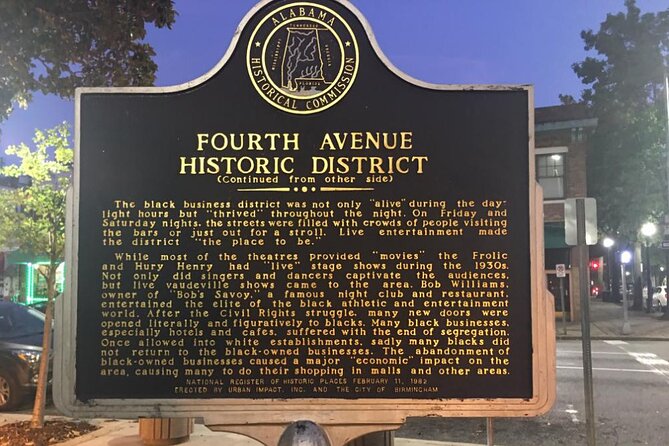
With a maximum group size of just 12 travelers, this Civil Rights history walking tour offers a truly personalized experience that fosters meaningful engagement.
Participants appreciate the intimate setting, allowing for deeper discussions and connections with the knowledgeable guides. The tour’s structure encourages questions and interaction, making it easy for travelers to share their thoughts and reflections on the significant events that shaped the movement.
Enthusiastic guides bring history to life, sharing stories and insights that resonate with each traveler. Unique activities, like coloring protest signs, add a creative touch, further enhancing the experience.
You can also read our reviews of more historical tours in Birmingham
- 2.5-Hours Walking Tour of Birmingham Into Black Heritage Madiba
- Iconic Birmingham: A Journey Through Heart & Heritage
- Birmingham Gangs Nighttime Historical Walking Tour With Pub Stops
- Historical Highlights of Birmingham
- 1963 Birmingham Civil Rights Experience – Black History Matters Walking Tour
- Pride History of Birmingham Tour
Health and Safety Guidelines
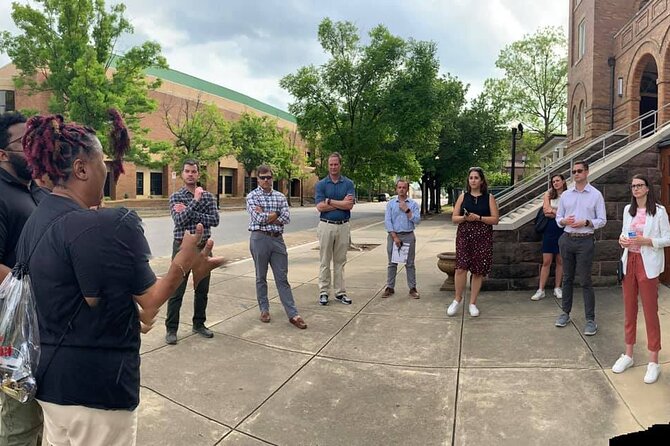
Ensuring a safe and enjoyable experience is a top priority for participants on the Civil Rights history walking tour. To maintain this focus, the tour has implemented specific health and safety guidelines.
Travelers should be aware that the tour isn’t recommended for those with back problems, pregnant individuals, or anyone with serious medical conditions. A moderate level of physical fitness is required to fully engage in the activities.
Key health and safety points include:
- Participants should wear comfortable shoes for walking.
- Staying hydrated is essential, especially in warmer months.
- Travelers should adhere to any local health advisories.
Customer Reviews and Feedback
How do travelers feel about their experiences on the Civil Rights history walking tour? They rave about it!
With a stellar rating of 4.9 and 95% recommending the tour, participants appreciate the enthusiastic guides who share their deep knowledge of Civil Rights history.
Many highlight the engaging personal interactions and meaningful discussions that bring historical events to life. Unique activities, like coloring protest signs, add an interactive element that resonates with travelers.
Booking and Contact Information
Travelers eager to experience the Civil Rights history walking tour can easily secure their spot through straightforward booking options.
The tour offers a variety of methods to ensure a hassle-free experience for all participants.
-
Pricing: Tours start at $65.99, providing an affordable educational experience.
-
Cancellation Policy: Enjoy peace of mind with free cancellation up to 24 hours before the tour.
-
Contact Information: For inquiries, travelers can reach out via phone at 866-259-9691 ext. 1 or email at [email protected].
With a maximum group size of 12, this intimate setting guarantees personalized attention while exploring Birmingham’s impactful history.
Don’t miss the opportunity to engage with the past in such a meaningful way.
Frequently Asked Questions
What Should I Wear for the Walking Tour?
For the walking tour, she should wear comfortable shoes for walking, lightweight clothing suitable for the weather, and a hat or sunglasses for sun protection. Staying hydrated with a water bottle is also a smart choice.
Are Food and Drinks Provided During the Tour?
Food and drinks aren’t provided during the tour, so travelers should plan ahead. They can bring snacks or water to stay refreshed while enjoying the insightful experience and learning about the impactful history of the area.
Can I Bring My Camera or Take Photos?
Travelers can bring their cameras and take photos during the tour. They’ll capture memorable moments and significant landmarks, enhancing their experience while learning about the impactful history of the Civil Rights Movement.
Is There a Specific Age Requirement for Participants?
There’s no specific age requirement for participants. Families with children often enjoy the experience together. However, organizers recommend that kids be old enough to engage with the material and appreciate the tour’s significance.
What Happens if It Rains on the Tour Date?
If it rains on the tour date, participants typically receive updates regarding adjustments. The tour may proceed with rain gear, ensuring everyone stays engaged and informed while exploring Birmingham’s rich Civil Rights history.
The Sum Up
To sum it up, the "Walking Tour: Civil Rights History – The Church, Children & Community" in Birmingham offers a unique opportunity to connect with the past. By exploring key landmarks and understanding the vital roles of churches and youth, participants gain insight into the resilience of the community. With intimate discussions and personal connections, this tour not only educates but also inspires. It’s a meaningful way to honor the legacy of the Civil Rights Movement and its ongoing impact.
More Walking Tours in Birmingham
- Footlights & Felonies: A Walking Tour of Vaudeville, Film & Crime
- Alabama Art Walk: Birmingham District Bonanza Bash
- Birmingham Self Guided City Walk and Interactive Treasure Hunt
- Private Birmingham Ghosts and Gallows Walking Tour
- Birmingham Must-see Attractions Walking Tour With A Guide
- 2 Hour Private Walking Tour of Birmingham
More Tours in Birmingham
More Tour Reviews in Birmingham
Not for you? Here's more nearby things to do in Birmingham we have reviewed
- Taste of Tuscaloosa, Brewery Tasting Tour
- Birmingham Civil Rights Scavenger Interactive Hunt Activity
- Tuscaloosa Bar Golf Pub Crawl
- Tuscaloosa Boutiques Tour
- VIP “TwentyFun” Birthday Tour
- Pokémon GO Tour
- Footsteps to Freedom Self-Guided Tour Through Birmingham
- Historical Golf Cart Tour of Tuscaloosa Landmarks
- Footlights & Felonies: A Walking Tour of Vaudeville, Film & Crime
- Alabama Art Walk: Birmingham District Bonanza Bash
- University Scavenger Hunt: University of Alabama Adventure
- Super City Birmingham Hop On Hop Off Driving App Tour
